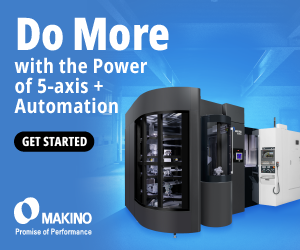Blogs for all/
Easy, accurate tracking of items through the manufacturing process is becoming more and more important in the quality-conscious 'Smart-Factory' era. RFID tagging has distinct advantages as a tracking method, but barcode scanning has its adherents too.
To reduce training time and improve worker safety in the high-risk environment of industrial manufacturing, Tobii Pro Insight conducts eye-tracking studies. For example, the Stockholm, Sweden-headquartered company reported that its research consultants conducted an eye-tracking study at the metal foundry of H&H Castings Inc., York, Pa., and the attention-based study revealed unique insights that will contribute to quicker onboarding of new workers, new efficiencies in its operations, new training guidelines and reductions in the risk of accidents.
In connection with the upcoming 50th anniversary celebration of Hurco Cos. scheduled for March 6 at the machine tool builder’s corporate headquarters in Indianapolis, I spoke with Michael Cope, the company’s product technical specialist.
Bob Hudson of New South Whales, Australia, responded to my April 11 blog titled "Assisting manufacturers with augmented reality."
A blade and knife manufacturer for the lumber industry suggested that it might have to close its plant in Michigan. The largest nail producer in the U.S. has laid off 60 workers and warns that it may be forced to move its factory to Mexico. A California cannery said its profit margins could drop by up to 70 percent over the coming months. A well-known motorcycle manufacturer said it’s shifting some of its production to foreign countries. What is this financial crisis that’s affecting so many manufacturing companies? In each case, the Trump administration’s tariffs on steel and aluminum are said to be the culprit.
After being at AB Sandvik Coromant, Sandviken, Sweden, for 17 years, Nadine Crauwels was appointed global president of the cutting tool manufacturer in May 2017. She has had roles in sales, product management, product introduction, custom tools and strategic relations.
As additive manufacturing and 3D printing of metal parts continues to make inroads into production environments, the need to efficiently and effectively finish-machine them when typically required gains importance.
Although picks, or plectra, for playing musical instruments are commonly plastic injection molded or stamped, some are machined.
In connection with the abrasive waterjet machining article scheduled for our March issue, I spoke with Jim Draper, owner of Rocky Mountain Waterjet, Greeley, Colo., who said when a parts manufacturer finds that waterjetting is a suitable process for a part or family of parts, the decision to outsource that work to a waterjet job shop or buy a waterjet machine for in-house production depends on the part quantity.
For the May issue’s focus on abrasive machining, I’m writing a multiple-source article about honing. One of the sources is Lapmaster Wolters LLC.
Florence, Ky.-based Mazak Corp. hosted the Midwest Technology + Education Event May 1-3 at its Midwest Regional Headquarters and Technology Center in Schaumburg, Ill. The machine tool builder exhibited and demonstrated an array of equipment, including milling, turning, 5-axis and multitask machines, and nine of the company’s Value Inspired Partners exhibited at the event.
As discussed in a recent issue of Cutting Tool Engineering magazine in the feature article “Lean into it,” a little lean manufacturing goes a long way. One factor that tends to trip up people and companies on their way to establishing lean cultures is sustainment. Phillip Canipe, vice president of sales and business development for the Southwest region at Stellar Industrial Supply Inc. in Tacoma, Washington, said 90 percent of companies are reluctant to re-examine processes that already have been inspected and improved.
Depending on whom you ask, you’ll receive wildly different unravelings of the acronym DFAM. To music aficionados, DFAM might mean “drummer from another mother,” clever branding from Moog Music Inc. to describe its newest line of percussion synthesizers. I wish I’d thought of that phrase. DFAM could mean the Darlington Farmers Auction Mart but probably only to those who live near there in England and are interested in buying a cow, goat or sheep. At The Walt Disney Co., DFAM refers to the extended family of employees who share the stress of working at the Magic Kingdom—as in, “I’m going to chill this weekend with my DFAM before the big Labor Day rush.” Then there’s the DFAM that manufacturers care about—or rather the additive manufacturers. That’s because DFAM is short for “design for additive manufacturing,” an acronym every bit as relevant to machinists as it is to people in 3D printing.
MC Machinery Systems is known as a supplier of Mitsubishi EDMs and laser machines, and Mitsubishi EDM/Laser is prominently displayed on the company’s headquarters in Elk Grove Village, Illinois, but several seminars focused on hard milling and 5-axis machining were presented during its EDM National open house. The event took place Sept. 26.
My Nov. 20 blog post titled "Manufacturers favor a digital workplace transformation but hold tight to their wallets" generated an insightful response from Jesse Z. Melton, owner of Harpers Ferry Toolworks.
Not every holemaking job requires a high-performance, solid-carbide or PCD-tipped drill with an advanced coating. For many, a HSS jobber drill will suffice.
Not only is automation continuing to displace workers at manufacturing companies, the thought of being ousted by a robot is making some workers at those plants feel sick. That’s according to a study by three Ball State University researchers and a Villanova University professor.
BIG KAISER Precision Tooling Inc. held its Breakfast & Learn 2018 open house May 8-10 at its headquarters in Hoffman Estates, Ill. Each day include a technical presentation. On the third day, John Zaya, workholding product manager for BIG KAISER, covered multiple-axis, quick-change workholding systems.
To gain more knowledge about Industry 4.0 developments, I participated in the Taiwan Smart Machinery Media Tour Aug. 20-24. The Taiwan External Trade Development Council hosted the event. The council reports that Taiwan has the highest density of precision machinery cluster in the world, exports almost 80 percent of its products and is the fifth largest export country for machine tools.
Continuous learning, continuous improvement, continuous generation of ideas—they’re all important things. I would like to think they’re especially important to manufacturers but am struggling to come up with a specific reason. Every business, from floral arrangers to drywallers, must continually adapt and evolve or face eventual corporate death. Perhaps the reason continuous learning and improvement are so relevant to manufacturing, which in this context means machining, is that our industry is one of the fastest changing in terms of technology.

















